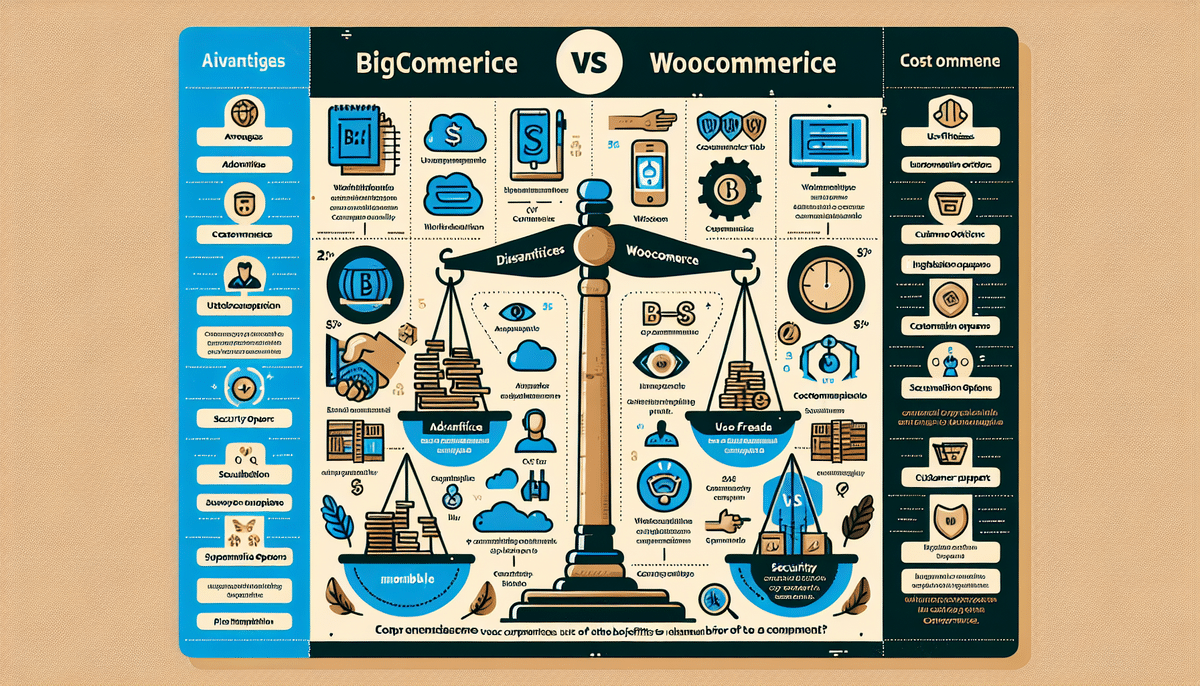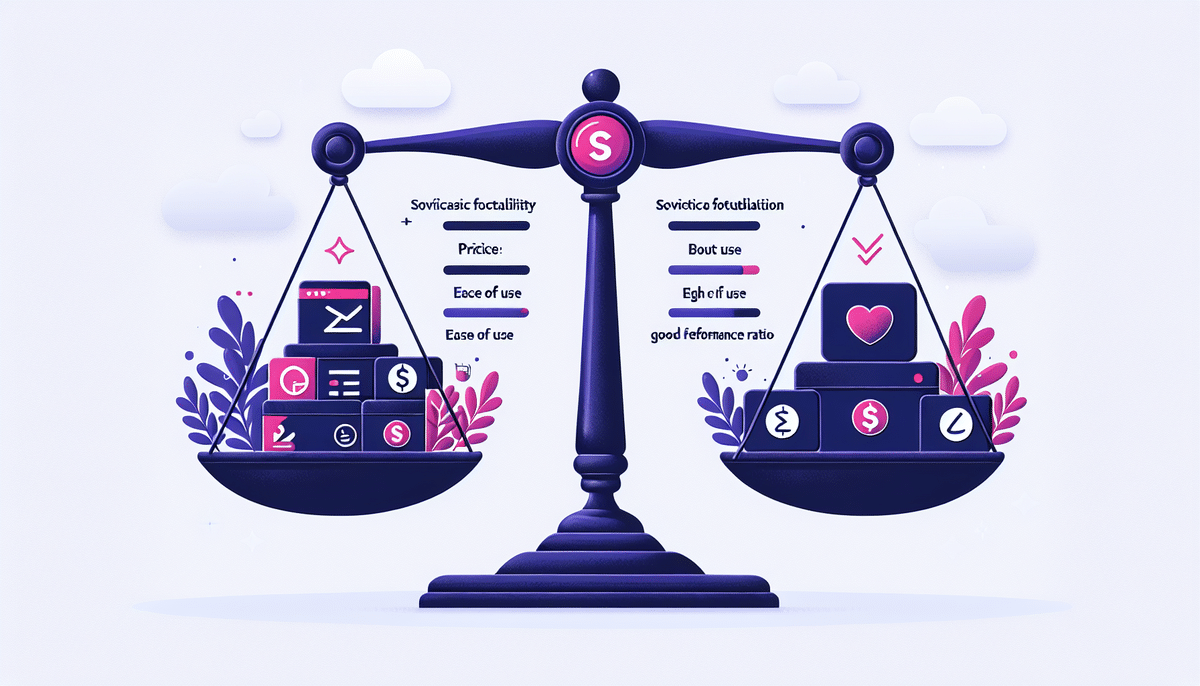BigCommerce vs WooCommerce: Choosing the Right E-commerce Platform for Your Business
As more businesses seek to establish a reliable e-commerce presence, selecting a platform that caters to your unique needs is essential. BigCommerce and WooCommerce are both popular e-commerce solutions, each offering distinct benefits for online entrepreneurs. In this article, we explore the pros and cons, key features, pricing, and ease of use of both platforms to help you determine which is better suited for your business needs.
Understanding the Basics: What are BigCommerce and WooCommerce?
BigCommerce is a comprehensive e-commerce platform that provides users with a wide array of tools and features. Designed to cater to businesses of all sizes, BigCommerce offers scalable solutions to meet the evolving needs of growing enterprises. Its robust built-in features allow for extensive customization through themes and templates, and seamless integration with various third-party tools enhances its functionality.
WooCommerce, on the other hand, is a powerful plugin that integrates seamlessly with WordPress, one of the most popular content management systems globally. WooCommerce offers comprehensive features, including payment processing, inventory management, and shipping solutions, capable of handling both downloadable and physical products. However, unlike BigCommerce, WooCommerce requires you to host it on a WordPress website.
One significant advantage of BigCommerce is that it is a fully hosted platform, eliminating the need to manage servers or software updates. This allows you to focus on growing your business without worrying about the technical aspects of running an online store. In contrast, WooCommerce requires you to manage your website's hosting, security, and updates, which can be time-consuming and may necessitate technical expertise.
Pros and Cons of Using BigCommerce for Your E-commerce Store
Pros
- Robust built-in features with numerous payment gateway integrations.
- Scalable platform that grows with your business, allowing easy addition of products and third-party tool integrations.
- User-friendly interface with customizable store designs requiring minimal technical expertise.
- Enterprise-grade security, including PCI compliance and fraud detection tools to safeguard your site and customer data.
- Comprehensive SEO features to enhance search engine rankings.
Cons
- Higher cost compared to WooCommerce, even at basic subscription levels.
- Limited customization options on the platform without advanced technical skills.
- Steeper learning curve for users with no prior e-commerce experience.
- Transaction fees apply on certain payment gateways unless using BigCommerce Payments.
Additionally, BigCommerce offers excellent SEO features that can help your store rank higher in search engine results pages. Its built-in analytics tools allow you to track performance and make data-driven decisions. However, BigCommerce charges transaction fees on top of its subscription fees, which can accumulate quickly with high sales volumes. While the platform supports a wide range of integrations, some users may find it lacks specific integrations necessary for their business.
Pros and Cons of Using WooCommerce for Your E-commerce Store
Pros
- Seamless integration with WordPress, an easy-to-use platform.
- Thousands of plugins extend the platform's functionality, offering limitless possibilities.
- Highly customizable using WordPress themes and HTML/CSS code modifications.
- Low barrier to entry with many free plugins available for small businesses.
- Large community support and extensive documentation.
Cons
- Less scalable than BigCommerce, potentially struggling with massive sales or high traffic without proper optimization and hosting.
- Lacks several essential features out-of-the-box, such as built-in payment gateways and store management tools, requiring additional plugins.
- Reliability is dependent on the hosting environment and the WordPress site it's integrated with.
- Security relies heavily on proper management and the use of reputable plugins.
WooCommerce also requires more technical knowledge compared to some other e-commerce platforms. While it is relatively easy to set up, customizing your store and troubleshooting issues may necessitate HTML/CSS skills or the assistance of a developer. Being an open-source platform, WooCommerce might be more vulnerable to security threats compared to closed-source platforms like Shopify or BigCommerce.
Key Features of BigCommerce for Your Online Store
- A comprehensive suite of tools that facilitate efficient store design and management.
- Easy integration with various payment options, including PayPal, Stripe, and 3D Secure.
- Robust security measures, such as fraud detection tools and PCI compliance.
- Advanced SEO tools like customizable URLs, meta descriptions, and sitemaps to enhance your store's search engine visibility.
- Flexible shipping options, including real-time carrier quotes and custom shipping rules.
- 24/7 customer support available via phone, email, and live chat.
Additional BigCommerce features include:
- Multi-channel selling capabilities, allowing you to sell on platforms like Amazon, eBay, and Facebook.
- Built-in analytics and reporting tools to track sales performance and customer behavior.
Key Features of WooCommerce for Your Online Store
- Extensive customization options with a wide range of themes and the ability to modify HTML/CSS code.
- User-friendly interface, suitable even for e-commerce beginners.
- Highly scalable, supported by thousands of plugins and seamless integration with WordPress.
- Built-in blogging functionality through WordPress, enhancing content marketing efforts.
- Flexible product management, allowing you to sell physical products, digital downloads, subscriptions, and appointments.
- Comprehensive reporting and analytics through various plugins.
WooCommerce's flexibility allows for virtually any type of online store, given sufficient time and the right plugin combination. Its integration with WordPress also enables robust content marketing and SEO strategies through plugins like Yoast SEO.
Pricing Comparison: BigCommerce vs WooCommerce
BigCommerce and WooCommerce have distinct pricing structures that cater to different business needs and budgets.
- BigCommerce: Offers subscription-based plans ranging from $29.95 to $299.95 per month. Each tier provides a varying level of features and support, with higher plans offering more advanced capabilities and lower transaction fees.
- WooCommerce: The core WooCommerce plugin is free, but essential costs include website hosting (ranging from $5 to $50 per month), payment gateway fees, and the purchase of premium plugins or themes, which can add up depending on your store's requirements.
BigCommerce is generally more expensive than WooCommerce but provides more features and comprehensive customer support with each package. On the other hand, WooCommerce offers greater flexibility in pricing but requires you to manage and possibly incur additional costs for hosting, plugins, and maintenance.
Ease of Use Comparison: BigCommerce vs WooCommerce
Both BigCommerce and WooCommerce offer user-friendly interfaces, but they cater to different levels of technical expertise.
BigCommerce
- Straightforward account and store setup with guided tutorials.
- Intuitive user interface that requires no additional technical knowledge or web design skills.
- Comprehensive customer support available 24/7.
WooCommerce
- Requires a WordPress website setup, which may involve a learning curve for beginners.
- Customization and troubleshooting may require knowledge of web design and development.
- Extensive community resources and documentation available to aid users.
According to a Statista report, WordPress powers over 40% of all websites, indicating its widespread use and the extensive resources available for WooCommerce users.
Customization and Flexibility: BigCommerce vs WooCommerce
Both platforms offer significant customization and flexibility, but they approach it differently.
BigCommerce
- Customizable store using over 100 free and premium themes.
- Requires minimal coding skills for basic customization.
- Limited access to underlying code compared to open-source platforms.
WooCommerce
- Unparalleled customization flexibility through thousands of plugins and themes.
- Full access to the codebase, allowing for extensive modifications and bespoke features.
- Ability to create virtually any type of online store with the right combination of plugins.
According to W3Techs, WooCommerce is used by over 28% of all online stores, primarily due to its high level of customization and integration capabilities within the WordPress ecosystem.
Integration with Other Platforms: BigCommerce vs WooCommerce
Integration capabilities are crucial for enhancing the functionality of your e-commerce store and streamlining operations.
BigCommerce
- Seamlessly integrates with major payment gateways, shipping carriers, marketplaces like Amazon and eBay, and social media platforms.
- Supports integrations with popular marketing, accounting, and customer service tools such as Mailchimp, QuickBooks, and Zendesk.
- Provides APIs and custom development options for specialized integrations.
WooCommerce
- Offers seamless integration through its extensive plugin architecture.
- Connects with numerous applications, including payment gateways, shipping services, marketing tools, and CRM systems.
- Beneficial integration with WordPress plugins enhances functionality and user experience.
For instance, WooCommerce integrates with WordPress.com for content management and with plugins like WooCommerce Jetpack to extend its core functionalities.
Security Features: BigCommerce vs WooCommerce
Security is paramount for any online store owner, and both BigCommerce and WooCommerce provide built-in security features to protect your site and customer data.
BigCommerce
- PCI compliance to protect cardholder data.
- DDoS protection and site monitoring to safeguard against potential attacks.
- Fully encrypted checkout and HTTPS site-wide to ensure customer information is secure.
- Regular security updates and patches managed by the BigCommerce team.
WooCommerce
- SSL encryption for site-wide protection of customer data.
- Secure payment gateways to protect transaction data.
- Third-party security plugins for anti-spam, two-factor authentication, and login protection.
- Requires regular updates and maintenance to ensure security, often handled by the site owner or a developer.
For enhanced security, WooCommerce users often rely on plugins like Wordfence Security and Jetpack to protect their websites from threats.
Customer Support and Resources: BigCommerce vs WooCommerce
Both platforms offer robust customer support and resources, ensuring that users can find assistance when needed.
BigCommerce
- 24/7 customer support available via phone, email, and live chat.
- Extensive knowledge base with articles, tutorials, and guides.
- Active community forums for peer-to-peer assistance.
- Professional support for enterprise-level users.
WooCommerce
- Support available through forums, documentation, and community resources.
- Extensive documentation and tutorials provided by WooCommerce and third-party developers.
- Access to professional support through WooCommerce extensions and specialized developers.
- Large community of users and developers offering peer support and solutions.
According to WordPress Support, the vast community and extensive documentation make WooCommerce a flexible platform with ample resources for troubleshooting and customization.
Which Platform is Better Suited to Your Business Needs?
The choice between BigCommerce and WooCommerce ultimately depends on your specific requirements and business goals.
BigCommerce
- Ideal for businesses seeking a fully integrated e-commerce solution.
- Best suited for companies that prioritize scalability, security, and comprehensive customer support.
- Suitable for users who prefer a hosted platform that handles technical aspects.
WooCommerce
- Perfect for businesses that require high levels of customization and flexibility.
- Best suited for those already familiar with WordPress or looking to leverage its content management capabilities.
- Ideal for users who are comfortable managing their own hosting, security, and technical maintenance.
BigCommerce is an excellent choice for businesses looking to streamline their operations with a hosted solution that offers robust features and support. However, it comes at a higher cost compared to other platforms.
WooCommerce offers greater flexibility and customization, making it suitable for businesses that want complete control over their online store's design and functionality. It may require a steeper learning curve and more technical expertise to manage effectively, along with potential additional costs related to hosting and plugins.
Migrating From One Platform to Another: Tips & Tricks
If you decide to switch from BigCommerce to WooCommerce or vice versa, it’s crucial to back up your data and ensure its compatibility between platforms. Here are some tips for a smooth migration:
- Backup Your Data: Ensure you have a complete backup of your existing store's data, including products, customer information, and order history.
- Use Migration Tools: Utilize migration tools such as Cart2Cart or platform-specific migration services to transfer your data seamlessly.
- Test Thoroughly: After migration, thoroughly test your new store to ensure all data has been transferred correctly and that the site functions as expected.
- Update URLs and SEO Settings: Ensure that all URLs are correctly mapped and that SEO settings are preserved to maintain search engine rankings.
- Inform Your Customers: Notify your customers about the migration to prevent confusion and ensure a smooth transition.
Both BigCommerce and WooCommerce offer migration guides and support to assist users in transitioning between platforms.
Case Studies: Companies Successfully Using BigCommerce or WooCommerce
Several reputable companies successfully use either BigCommerce or WooCommerce. Notable examples include:
- BigCommerce: Asics, Skullcandy, and Paul Mitchell.
- WooCommerce: New Balance, Weber Grills, and Paula's Choice.
Future Updates and Developments for Both Platforms
BigCommerce and WooCommerce continually release updates and new features to enhance their platforms' functionality and performance. Looking ahead, both platforms are expected to integrate Artificial Intelligence (AI) and Machine Learning (ML) technologies to improve user experience and provide businesses with valuable insights and data about their customers.
- BigCommerce: Focusing on enhancing multi-channel selling capabilities, improving mobile commerce experiences, and integrating more advanced analytics and AI-driven tools for personalized marketing.
- WooCommerce: Emphasizing tighter integration with WordPress updates, expanding plugin ecosystems, and leveraging AI for customer service chatbots and predictive analytics.
Staying informed about these updates can help businesses leverage new features to stay competitive in the evolving e-commerce landscape.
Conclusion
Both BigCommerce and WooCommerce are exceptional e-commerce platforms catering to a wide range of businesses. Your choice between them should align with your unique business needs, budget, and goals. This in-depth comparison highlights the benefits and drawbacks of each platform, helping you make an informed decision for your online store.




















